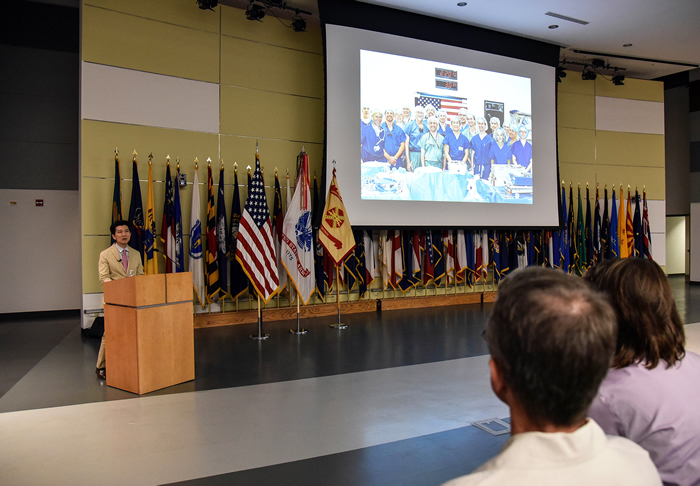CDMRP Professional Development Series Welcomes Pioneer Surgeon

The U.S. Army Medical Research and Materiel Command's Congressionally Directed Medical Research Program welcomed Dr. Wei-Ping Andrew Lee to the Fort Detrick auditorium as part of the CDMRP professional development series Aug. 6.
Lee, current professor of plastic and rehabilitative surgery and director of the department of plastic and reconstructive surgery at Johns Hopkins University School of Medicine, delivered the audience with a captivating lecture on "Changing the Risk-Benefit Balance of Vascularized Composite Allotransplantation."
Lee is a true pioneer in the area of hand transplantation, being among the first to perform a single hand transplant in the United States in March 2009. Lee went on to lead a team of surgeons to perform the nation's first double-hand, or bilateral, hand transplant in May of 2009, and then later was also the first in the nation to perform a transhumeral transplant in 2010. Moving forward to 2012, Lee and his team then successfully performed a second bilateral arm transplant on an Iraq War veteran quadruple amputee. Having established multidisciplinary programs for hand transplantation at both Johns Hopkins and the University of Pittsburgh, Lee and his team have performed, and continue to perform, exceptional and life-changing work.
"We believe that this is an area worth maturing," commented Lee concerning the importance of transplantation advancement and what these procedures give back to recipients; "because, when you have nothing, little is a lot."
Transplantation is a fast-developing and exciting field, with incredible advancement occurring since the first successful hand transplant in France in 1998. Worldwide, there have been 227 total Vascularized Composite Allografts, or VCAs, performed; with the vast majority of those being hand transplants, coming in at 113.
"In the last 18 years or so around the world, a number of VCAs have been performed," said Lee, and "even though Europe led the way in the beginning, the United States is catching up."
According to Lee, there are more major limb amputations returning from Iraq and Afghanistan than ever before; and Lee and his team feel a strong pull towards this "particularly deserving" group of single, double, triple and even quadruple amputee men and women returning from theatre.
"Everyone here knows how devastating an amputation can be," said Lee to the room full of attendees sitting before him; and "even though we're not saving their life, VCAs can be life giving."
The work Lee and his team are doing increases transplant recipients' independence and function, allowing these individuals to actually have the ability to return to work/school and move forward with their lives; an option they did not, and would not, have had without transplantation. Although the use of prosthetics has proven life-changing as well, prostheses have their shortcomings; and for the hand in particular, a prosthetic can in no way ever replace what is lost with a hand.
"Prosthetics, despite all their advances, cannot fully replace the multiple tasks of the human hand, such as the ability to touch and to feel; to give a hug or to hold your loved ones hand," explained Lee.
New advancements by multidisciplinary, multi-institutional research teams like Lees are changing the transplantation paradigm. Surgical endeavors as complex as transplantation may come with their own unique challenges and complications -- requiring the technical competence of many different areas of expertise -- but when weighing the costs versus the benefits, Lee and his team have found that the benefits far outweigh the risks; improving the patients' quality of life in unimaginable ways. With many patients currently waiting on the donor list for VCAs, Lee and his robust laboratory team look forward to many more opportunities to change the lives of amputees.
"I consider all of you here as an integral partnership force in this endeavor," said Lee in closing, "so, 'thank you.'"
This CDMRP event was organized by the CDMRP professional development working group.
 An official website of the United States government
An official website of the United States government
 ) or https:// means you've safely connected to the .mil website. Share sensitive information only on official, secure websites.
) or https:// means you've safely connected to the .mil website. Share sensitive information only on official, secure websites.


